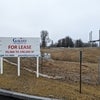Bill Would Put Choke-Saver Safety Rule On All Eateries
Coffee shops, bistros and so-called holes in the wall will no longer be allowed to skirt a state health law if a bill passed by the Massachusetts House last week becomes law.
The bill would close a loophole that exempts restaurants with seating for fewer than 25 people from a state law that requires such businesses to have someone on-site who is trained in the procedures for removing food lodged in someone's throat, according to Rep. Ruth Balser (D-Newton).
"Our point is someone can choke if there's only 23 seats as easily as if there were 30 seats," Balser said.
Massachusetts Restaurant Association lobbyist Stephen Clark said the law requiring restaurants with seating for 25 or more to have a "choke saver" certified staffer on site has been on the books since 1980, and the association is neither opposing nor supporting the new legislation.
"We've technically taken no position on the bill," Clark said. However, he said, if the bill becomes law it could affect restaurants' bottom lines. "Any time that there's a regulation passed, there is a cost associated with that."
The Restaurant and Business Alliance opposes the legislation, saying it will be a burden on businesses.
"With the Massachusetts hospitality industry losing 7,000 jobs in the last three months, we should not add more costs to our small businesses," RBA President David Andelman said in a statement. "While we applaud the good intention of this bill, it is not fair that this vague bill burdens any businesses with liability for something beyond their control."
Jarrett Barrios, CEO of the American Red Cross of Eastern Massachusetts, said safety training is "a small burden" that reaps a "huge reward."
Barrios said the choking training requirement is less burdensome than the requirement for sprinklers or for signage about allergies but could mean the difference between life and death.
"Oftentimes it takes paramedics too long to get there, and to save a life requires immediate response," Barrios said.
Clark said he was not sure how many restaurants have a seating capacity of fewer than 25, but said "there's probably more than you think," noting that many Dunkin Donuts and Starbucks fall into that category.
Boston, for example, has 4,150 restaurants, according to its Inspectional Services Department, but the city does not track how many have seating for fewer than 25 people.
Before the bill was passed on Tuesday, Balser amended it to exempt take-out only restaurants and to remove an old provision calling for restaurants to maintain a device used to remove food, which Balser said has been deemed dangerous and is not in use.
The bill now heads to the Senate for its consideration during informal sessions that will run through the end of 2012 and where debate and recorded votes are not allowed.
The legislation leaves it up to the Department of Public Health to adopt regulations.
The legislation was prompted by concerns from Newton's health and human services department. "I think that they just were concerned about the risk to people of choking and they felt that this was a huge loophole," Balser said.
While there was not a particular incident that caused concern among the city's health officials, Balser said, choking remains a real health hazard in the state. In 2007, 19 Massachusetts residents' deaths were associated with choking on food, according to a Newton public health official.
In fiscal year 2008, there were 202 emergency room discharges and 123 inpatient hospital discharges that were "associated with nonfatal choking," according to a letter sent by Robin Williams, senior environmental health specialist for the Newton Health and Human Services Department. Choking is a leading cause of injury and death among children, according to the letter.
Newton and Framingham offer classes for $30, according to the letter, but "choke saver" classes elsewhere are not as easy or inexpensive to take, Clark said.
"I think it's just a matter of where classes are available. Yeah, certain towns have programs but many towns do not," he said. "There is no one place to go for certification."
The American Red Cross provides a two-hour restaurant emergency training program for $50 per person that includes "choke-saver" skills, according to Kat Powers, a spokeswoman for Red Cross of Eastern Massachusetts. Red Cross trained 800 to 1,000 people statewide last year.
Read more
Summer Brings Life To ‘Restaurant Row’
Restaurant Group Headed By Phantom Gourmet CEO At Odds With Industry Association









0 Comments